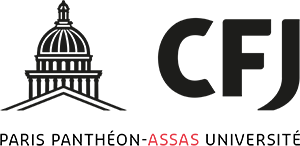A successful international education
European and International Relations Office
The European and International Relations Office helps incoming and outgoing students with administrative, course-related and organizational issues (finding accommodation, administrative and logistical procedures etc.) Staff include an administrative representative of the school and a member of the teaching staff. They report directly to the managing directors of the CFJ.
The EIR office is in charge of renewing existing partnerships, identifying new partners and defining the terms of new partnerships. The staff submit partnership proposals to the managing directors of the school and, for major agreements, also to the governing board or the general assembly. They are also in charge of promoting partnerships by all means possible, including the CFJ web-site, newsletters and social media accounts.
On a daily basis, the EIR office staff are the first point of contact for students and CFJ staff members for any questions concerning studying abroad within Europe or the rest of the world. They provide the technical support necessary to set up an incoming or outgoing study abroad plan and help set out the terms of the learning or study abroad agreement, as well as supporting students throughout their stay abroad. They are also the first point of contact for students and staff members at partner schools, particularly during their time at the CFJ. In addition, they can be contacted by partner (or possible partner) schools for any questions about CFJ degree programmes or equivalencies.
The EIR office is supported by the university association heSam, which has an ad hoc study abroad unit.
Contact: Ms. Michèle Martin mmartin@cfjparis.com
Integration and mentoring
The EIR office staff appoint a mentor for every study abroad participant – the main teacher for the semester and the course concerned – as well as one or several primary contacts among their peers, be they students or teachers. All those involved contribute to the study abroad experience both before and as it happens, as well as after it takes place. Formal meetings are set up throughout the period (via videoconference for outgoing students).
The CFJ’s courses are globally designed as a succession of project-based classes which combine theory and practice. The CFJ’s policy as a host institution means that incoming students can work on one or several projects, usually as apart of a group, from start to finish. This approach allows incoming students to join groups of existing CFJ students seamlessly and benefit from the exact same mentoring system.
Course validation and ECTS credits
Before embarking on a study abroad project, all students must set out the terms of their learning or internship agreement with the help of the European and International Relations Office and its equivalent at the host institution. The agreement must list the courses and the credits to be validated at the host institution (or the expected duties in the case of an internship).
Learn more about evaluations and ECTS credits
Outgoing students
Towards the end of a CFJ student’s study abroad programme, the host institution sends their grade sheet to the European and International Relations Office. The Head of Studies checks everything matches the initial learning agreement and registers the grades. S/he then ensures that the validated ECTS credits are taken into account at the CFJ. For an internship completed abroad, a certificate testifying to the tasks completed is delivered by the host media channel in accordance with the exact terms of the internship agreement (duration, responsibilities, skills acquired).
The credits earned in this way can help a student in difficulty at the end of their first year to move up into the second year, and also count towards their final degree, which necessarily includes any credits validated while abroad. No extra course or probationary exercise is required, except if the student concerned has failing grades. If a student has partially validated their credits, they can complete a probationary exercise. Study abroad programmes are listed in their degree supplement.
Incoming students
For incoming students, the teaching staff check grade sheets have been validated and transmit them both to the student and to the European and International Relations Office, which ensures the terms of their learning contracts and more generally, the institutional partnerships have been respected, especially in terms of dates. The office then sends the grade sheets to the student’s home institution.
Language skills
Outgoing students
Students who plan to study abroad are selected according to the host institution’s criteria in terms of language level. All candidates are informed of these criteria and advised on preparing for tests. Level B2 in the relevant language is generally required.
Candidates’ level of English is evaluated when they apply to the CFJ and appraised by a jury. The CFJ then helps maintain this level throughout our two-year programme thanks to the regular use of sources in English and various exercises carried out directly in English (for example, during short trips abroad). English is one of the subjects for which students earn ECTS credits.
In addition to the above, the CFJ allows students to take language classes (in languages other than English) as part of an agreement with l’Ecole Normale Supérieure. In time, students gain access to an OLS (Online Linguistic Support) e-learning platform to complete the language training provided by the CFJ.
Incoming students
All of the CFJ’s courses are taught in French except specific sessions otherwise listed in our course catalogue. Given the high levels of interaction with CFJ students, but also the practical nature of journalism courses, which involve working with French contacts on a multitude of subjects (reports, presentations, investigations), we require C1 level French. The same level of skill is required of all incoming teaching or administrative staff.
Candidate student or staff’s level and needs in terms of language support are identified with help from their home institution. Use of the OLS ‘Online Linguistic Support’ e-learning platform in the months preceding the programme’s start date is strongly encouraged.
In order to prepare for their first classes in September 2020, the CFJ plans to organize an introductory French language and culture course during the month of August for international students and/or non-French speakers (provided there are sufficient enrolments). This course will be open to both incoming students and staff.
Contacts
Centre de Formation des Journalistes
European and International Relations Office
210 rue du Faubourg Saint-Antoine
75012 Paris
France (Europe)
Ms. Michèle MARTIN mmartin@cfjparis.com
Le média de la 77e qui vous plonge au cœur des Pays-Bas
L'EUROPE A PERTE DE VUELe dossier spécial de la majeure newsroom de la 77e
MOULALe média éphémère sur Instagram de la 76e promo Local/Global
LUNDI DE L'INALe « Lundi de l’Ina » dédié à la protection des océans, organisé par la 77e et l’Ina
POLSKALe magazine de la 77e promo à Varsovie
WL'école post-bac
 |
Établissement d’enseignement supérieur privé 210 Rue du Faubourg Saint-Antoine 75012 Paris 01 44 09 42 02 |

210 Rue du Faubourg Saint-Antoine
75012 Paris
01 44 09 42 02
.svg) |
Nous trouver |
